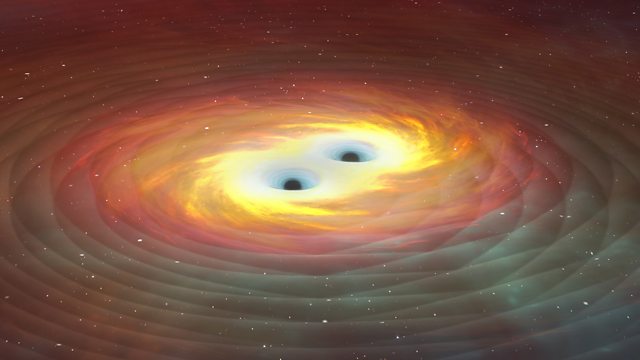Stephen Hawking gets it right again
Gravitational waves show two black holes merge just how Hawking predicted. Plus, a space mission without a target.
Gravitational waves show two black holes merge just how Hawking predicted. Plus, a space mission without a target. And a Space probe without a confirmed budget.
In January 2025 the LIGO gravitational wave observatories witnessed two distant black holes spinning into each other. In the ten years of LIGO’s operations, that’s not a first. But the instruments have been improved to such an extent that this time some very important predictions of General Relativity and out understanding of black holes could be tested. As Birmingham University’s Alberto Vecchio says, the elegant simplicity of the mathematics of black holes has passed a test, in particular Stephen Hawking’s prediction that the surface area of merging black holes can only be increased.
Space craft have met comets before. But because spaceflight takes so long to plan and fund, we’ve only sent them to comets with human-lifetime orbital periods so far, because we know when they’re arriving. ESA wants to meet one we’ve never seen before, one that has never or seldom been in close to the sun, and never been barbecued and seared by the radiation. Colin Snodgrass of the University of Edinburgh explains the plan to launch and park a comet chaser in space to wait for one of these elusive extraterrestrial objects to come in from the cold.
That, says Meg Schwamb of Queen’s University Belfast, is going to be much easier in the next few years as the Vera Rubin Telescope begins its ten year survey cataloguing anything in the sky that changes. The type of sky survey it will provide will identify, it is hoped, many candidate first-time comets for the small fleet of spacecraft to intercept.
Having a spacecraft ready in position rather than having to launch a new one anytime you want to do some science is a good place to be, one would think.
NASA’s Juno mission has been delivering science from Jupiter since its launch, and is still functioning and able to deliver more. Yet NASA funds are under considerable threat, and as Scott Bolton tells Roland, at the end of this month Juno could be left slowly spiralling into the gas giant, silently collecting data but with no budget to keep the science going.
Presenter: Roland Pease
Producer: Alex Mansfield
Production Coordinator: Jana Bennett-Holesworth
Last on
Broadcasts
- Thu 18 Sep 2025 19:32GMTÃÛÑ¿´«Ã½ World Service
- Thu 18 Sep 2025 22:32GMTÃÛÑ¿´«Ã½ World Service Europe and the Middle East
- Fri 19 Sep 2025 04:32GMTÃÛÑ¿´«Ã½ World Service Australasia, Americas and the Caribbean, South Asia & East Asia only
- Fri 19 Sep 2025 08:32GMTÃÛÑ¿´«Ã½ World Service
- Fri 19 Sep 2025 12:32GMTÃÛÑ¿´«Ã½ World Service Australasia, East and Southern Africa, News Internet & West and Central Africa only
- Sat 20 Sep 2025 01:32GMTÃÛÑ¿´«Ã½ World Service News Internet & East Asia only & Live News
- Sun 21 Sep 2025 23:32GMTÃÛÑ¿´«Ã½ World Service except East Asia, Europe and the Middle East, News Internet & South Asia
- Mon 22 Sep 2025 00:32GMTÃÛÑ¿´«Ã½ World Service Europe and the Middle East
Podcast
-
![]()
Science In Action
The ÃÛÑ¿´«Ã½ brings you all the week's science news.


